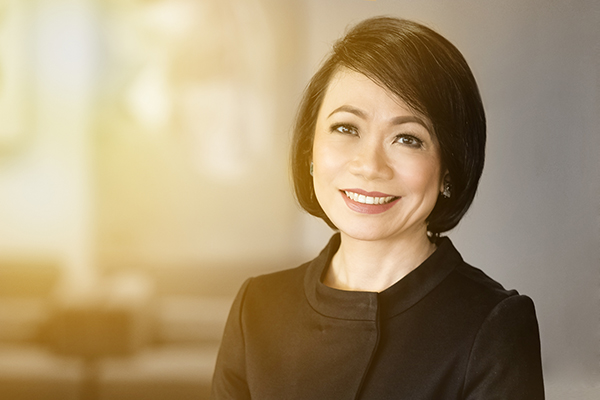Rizalina Mantaring is the quintessential success story—a top business leader in the Philippines who never let the label of being ‘woman’ or a ‘mother’ become a drawback for her to break the glass ceilings.
She led the largest and oldest life insurance company, Sun Life Financial Philippine Holding Company, Inc. as chair, and hailed as one of the top business leaders in the Philippines, with numerous accolades under her belt.
“I worked hard, made sure I delivered on all my commitments, had lucky breaks, and took advantage of opportunities I was presented,” Mantaring told The Filipino Times in an e-mail interview. “I never thought of it as being any different because I was a Filipina, or a woman, and I never felt disadvantaged just because I was either.”
The 59-year-old Filipina is also a mother of three and thinks of being a mother as a noble full-time job as well. This said, being a mother or a wife should not be an excuse for any Filipina to push herself to choose either family or career. She aimed to excel both in her chosen career and being a good mother.
For more than 30 years, she worked her way up the ladder from being a chief programmer of a computer company to being a chief operating officer.
During her helm as chief operating executive and President, Sun Life grew its premium income by an astounding 250 percent and client base from under 1 million clients to 3.6 million.
But for Mantaring her biggest achievement is that all her three children graduated with honors in the University of the Philippines.


Her strategic advantage though is having an enlightened husband. “My husband became president of a multinational company long before I did — I was a manager at that time. But he never hesitated to do his share. If I couldn’t pick up the kids’ report cards, he would do it. If I couldn’t attend a school event, he’d be there even if he was the only dad,” she related.
When times get hard and her worries become burdensome, her husband also becomes her biggest cheerleader. “He has also provided wise counsel. When you’re a CEO, you can’t just talk about your problems with anyone,” she said. “My husband has always been a great sounding board, and he could also tell me when I was wrong.”
It may also sound cliché for some, but having a good foundation was critical in each step of the way towards success. This part is what others may call “luck”, but it is only as good as being able to use it and take advantage of it. In her case, her parents raised her to do her best, to learn and adapt.
“I started out as an introverted techie who never wanted to handle people. By the time I became CEO, my profile had completely changed and continued to change. From someone who preferred to stay in the library as a child, I learned to be comfortable speaking before large audiences, mingling with people I didn’t know, and dealing with media,” she shared.
Her parents became her model too in treating people equally. “When you are genuinely concerned about people, they see it, just as they see when it isn’t real. As Gen. Colin Powell said, people follow you when they know you have their best interests at heart,” she said.
She imparted that being an empowered woman means doing what it takes to get to the top, and “not having to think that you are a woman”.
“When she fails, she does not blame it on being a female, but figures out what went wrong then goes about solving it. When obstacles block her way, she figures out how to overcome them. She does the best she can whatever she is given, and marshals the resources she needs to succeed,” she said.
It saddens her though that some Filipinas are afraid to take the opportunity to become a top executive. “These days, you will find that while female participation in the workforce is lower, there are more females than males at executive levels, and they are paid more highly, per the latest report of the government think-tank, the Philippine Institute for Development Studies,” she noted. “Interestingly, however, there are fewer female CEOs. It appears that when it comes to getting the top job, many females opt not to go for it.”
While acknowledging that her being a woman didn’t prevent her reaching the top, she acknowledged that there are some adjustments that can be improved in the workplace, particularly for women.
“When a woman has a baby, for example, she is usually the natural caregiver, staying home when a child is sick and they have no house help, or quitting her job entirely when help can’t be found. Perhaps companies can put up daycare centers, even if only emergency ones as a start, where women can leave their children if the help suddenly leave,” she said.
She also suggests other measures that companies can adopt to help employees who are both parents:
1. Allow work from home to help either of the parents to care for sick children.
2. Training sessions during office hours and not on weekends or after office hours to allow parents to spend more time with their children.
3. Paternity leaves to be of the same length as maternity leaves so that both parents take an equal share of caring for their newborns.
Helping women to manage their family’s finances, said Mantaring, would also help the government address the poverty gap. In the domestic front, financial literacy scores big for women independence, she underscored. “Women who are financial stable are probably less likely to be abused than women who depend on their partners.”
Majority of micro small, medium enterprises in the Philippines are run by businesswomen, she noted. Getting good financing to help grow their businesses, however, has been a challenge as many of them depend on 5/6 or usurious lenders. “So perhaps making it easier to get financing for MSMEs will allow them to grow their businesses and do better financially,” Mantaring said.
While she has no major life drama to share, she said she still continues to tell her story to inspire women like her to take that leap of faith in going to the top. Coaching and motivation, or as they say, “extra push”, is needed.
So, while many people debate that life work balance is a myth, Mantaring claims she has done it as a woman. Indeed, the power is conquering all from within.
Feature
Women can’t have it all? Meet the Filipina top boss of Sun Life Philippines who raised 3 kids with UP honors







